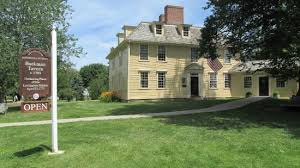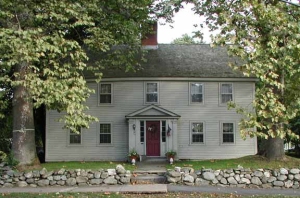
The first taverns in the Massachusetts Bay Colony were referred to as ordinaries. They were a familiar social institution and essential to the social and political lives of its citizens. The first tavern was opened in Boston in 1634, and the demand grew rapidly. They were regulated by licenses to control intoxicating liquors. In 1656, the courts in Massachusetts fined towns who did not have an ordinary.
Ordinaries served numerous purposes in the towns and villages. They were places where travelers could find food and drink and then spend the night. The local colonists could enjoy alcoholic beverages and play games and participate in political discussions while receiving the latest news.
Ordinaries were conveniently located close to the meetinghouse which was considered desirable. The congregation could find refuge in the cozy establishment between church services during the cold, bitter months where they endured long sermons in the frigid, unheated meetinghouse. The crackling fireplace and warm rum of the ordinary must have been viewed as God’s kind provision during the harsh winters. During summer’s sweltering heat, the green trees of the tavern courtyard offered pleasant shade for the overheated churchgoers.

The ordinaries were in all probability furnished in much the same manner as the private houses in New England. The tap room was the largest room in the house and had a warm and welcoming fireplace.Tables, stools, and chairs stood on the bare sanded floor. A small writing desk was available for the use of the travelers for letter writing and for the landlord to prepare his bills. The bar was often made with a sort of portcullis gate that could be closed when necessary. The customers’ firearms were hung on hooks on each side of the huge chimney.
The most popular early drinks served in the ordinaries were rum, cider, and ale. By the 1690’s, flip became a favorite. It is a blend of rum, beer, molasses or dried pumpkin, and eggs or cream. It would be whipped to a froth by plunging a flip-dog or hot fire poker into the pitcher.
Ordinaries were places of hospitable convenience and not for lively entertainment. “Sport of the Innyard” were forbidden: carding, dicing, tally, bowls, billiards, slidegroat, shuffleboard, quoits, loggets, and ninepins. Tobacco use was viewed as far more sinful and dangerous than the intoxicating liquors served.
The local tithingmen kept the ordinaries under careful scrutiny and excesses would be reported to the town magistrates and ministers. Offenders would be punished by being thrust into the bilboes, time in the stocks and receiving a whipping.
The most important alternative use of the ordinary was as a meeting place for courts and assemblies. Sessions of Salem and Ipswich Quarterly Courts were held in the ordinaries until 1673, and the proprietors received financial compensation for their services. These important centers for social assemblies promoted venues for debate and discussion of political and financial concerns of the colonial societies. Alice M. Earle, a prominent historian on Puritan history, viewed the tavern as a traditional institution “whose effect was to pull fledgling communities together.”
The local militia made use of the taverns for both governmental and social purposes. Here they would not only gather to choose officers and plan military campaigns, but also would imbibe in the wines, rum, and blackstrap that was in abundant supply.

The Ingersoll Ordinary in Salem Village (now Danvers) was open in 1677 after Nathaniel Ingersoll secured a license to “keep a hous of entertainment for strangers and othes by seling beere and sider and lickers and provision.” Ingersoll’s Ordinary was the place where the first three accused women, Sarah Osgood, Sarah Good and Tituba of the Salem Witchcraft Trials were taken for questioning